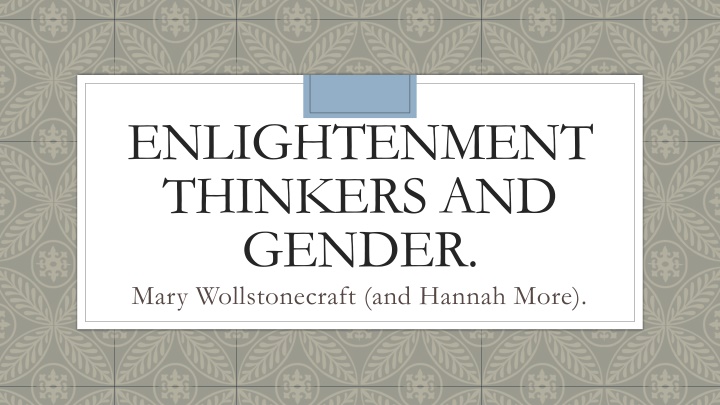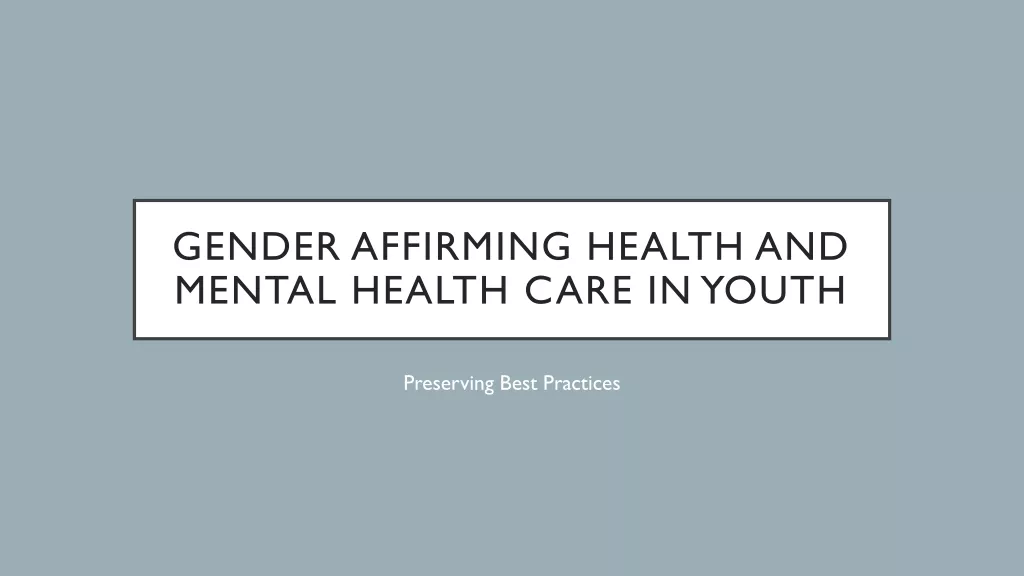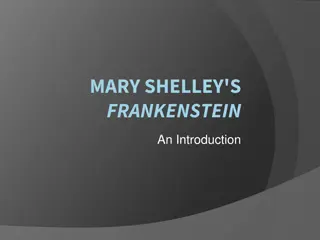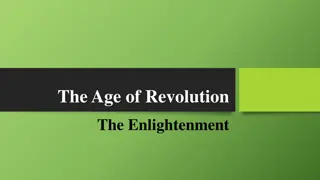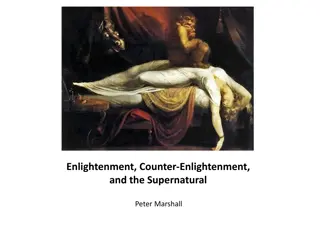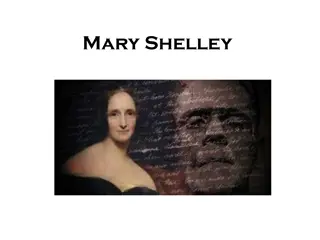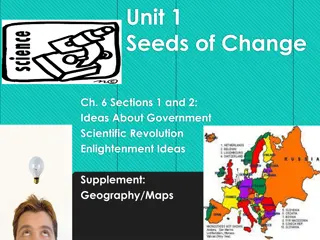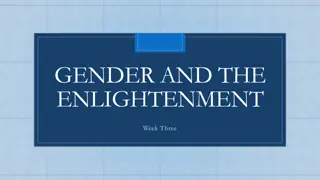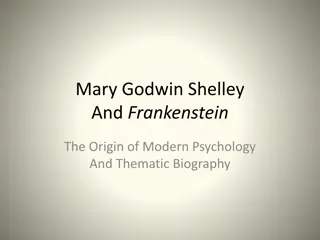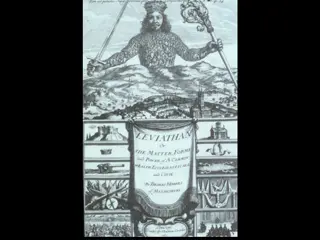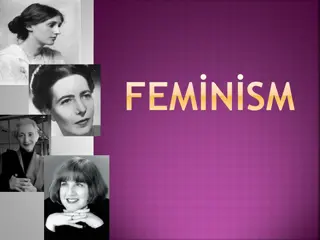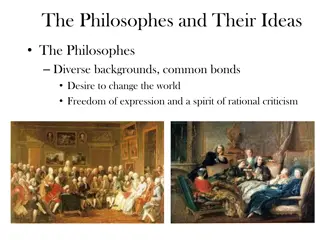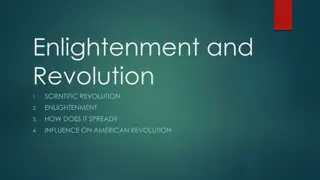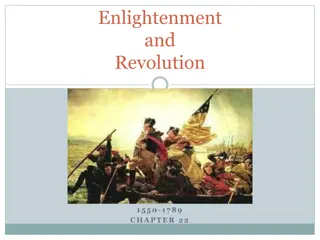Enlightenment Thinkers and Gender: Mary Wollstonecraft and Hannah More
Mary Wollstonecraft, a key Enlightenment thinker, challenged traditional gender roles and advocated for women's rights through her writings and beliefs. Influenced by thinkers like Rousseau, her work emphasized education and the empowerment of women. Explore her life, ideas, and impact on society.
Download Presentation

Please find below an Image/Link to download the presentation.
The content on the website is provided AS IS for your information and personal use only. It may not be sold, licensed, or shared on other websites without obtaining consent from the author.If you encounter any issues during the download, it is possible that the publisher has removed the file from their server.
You are allowed to download the files provided on this website for personal or commercial use, subject to the condition that they are used lawfully. All files are the property of their respective owners.
The content on the website is provided AS IS for your information and personal use only. It may not be sold, licensed, or shared on other websites without obtaining consent from the author.
E N D
Presentation Transcript
ENLIGHTENMENT THINKERS AND GENDER. Mary Wollstonecraft (and Hannah More).
Mary Shelleys Frankenstein. 1816 Swiss Alps. Competition: Mary Shelley, Percy Bysshe Shelley and Lord Byron. Socialism: The monster represents working class. Doctor middle class profession playing God. Promethean figure - thirst for power. Gender: Female author, Dr Frankenstein gave life to monster procreation a female role. Dr abandons responsibility to monster as men abandon lovers/illegitimate children. Fitting themes for the daughter of Mary Wollstonecraft.
Mary Wollstonecraft, 1759-97 From middling classes. 1783: MW and 2 sisters faced with prospect of having to support selves. Options: governesses, lady s companion or est. school. Eventually managed to support herself in London as a woman of letters. Unhappy experiences as governess influenced Thoughts on the Education of Daughters (1787).
Thoughts on the Education of Daughters. Template for Vindication of Rights of Women. Schools make women frivolous not virtuous. Parents should develop a child s capacity for reason. Education was a training in morality and self control. Forwards popular idea that education makes women better wives.
Mary (1787) Influenced by Rousseau s Emile natural upbringing. Female protagonist self-educated and forced into matrimony. Mary falls for invalid but remains true to husband. Death is only way to gain freedom. Cultivate virtue and reason at price of personal happiness. Uses Christian idea of rewards in next life to justify sacrifice.
Richard Price In 1789 Dr. Richard Price, a Unitarian minister preached a largely innocuous sermon "On the Love of Country." Commemorating Glorious Revolution of 1688 where William of Orange defeated Catholic King James II. Congratulated French National Assembly, for opening new possibilities for religious and civil freedom Price spoke of being a citizen of the world with the rights that citizenship implied. Argued for doctrine of perfectability that world can be made better through human effort. Justified social reform.
Burkes Response: Responded with Reflections on Revolution in France. Overthrow of authority in France would bring chaos and disorder. Denied Price's assertions of natural rights and doctrine of perfectability. Viewed himself as moderate. Argued Reflections had gradualist reform agenda. Reform in France should recognise Europe was already improving. Praised reforming institutions eg Church, arts, commerce and the landed gentry. Veiled criticism of dissenters and radicals in Britain. Provoked backlash of publications.
Wollstonecraft defends Price A Vindication of the Rights of Men (1790). Presented Burke as former reformer, grown old and confused, basically a good man but one corrupted by the English establishment. Argued for rights of civil and religious liberty. Aristocracy displaced in France was decadent. Criticized Burke's sympathy for women of the displaced aristocracy in France particularly his eulogising of Marie Antoinette as selective, ignoring the many more thousands of women who suffered under the old regime Attacks Burke s defence of Property. Gains notoriety by taking on establishment figure.
Lover no.1 Henry Fuseli Married Swiss Painter. Platonic love affair? Mary dislikes his attitudes on gender the epoch of eunuchs was ever the epoch of viragoes Writes Vindication of Rights of Woman to re-educate and impress him. She unsuccessfully proposed to live with Fuseli and his wife, he ended their connection and she went to France to recover from rejection.
Vindication of the Rights of Women (1792) Tension between passion and virtue enhances puritanical aspect of work. Not arguing for sexual equality. Agrees with Rousseau that freedom will lead to excess like slave uprising in St Dominique in 1791. God gave all humans reason to cultivate virtue. Virtue must be freely chosen not forced on women through obedience. Women not naturally cunning, role forced on the by powerlessness. Love: a destructive fantasy .
Themes: Education Without education only option is to marry which makes marriage legalised prostitution . Pursuit of reason would subdue female passions. Educated women have purity of mind . Attacked earlier writers, e.g. Rousseau, who suggested girls interests be subordinated to boys and not able to attain same levels of virtue. Women corrupted by expectation that they would be governed by their feelings, their vanity, their pursuit of accomplishments to attract men. Right kind of education could transform the female character. Advocates mixed gender education (Mary Astell) leads to early marriage and stops male debauchery.
Themes: Rights Ground breaking: Links gender issues with politics. (WLM: The personal is political!) Without political rights women in perpetual childhood. Female voice needed in politics/active citizenship. Gender equality benefits whole of society. Women can lead way in moral regeneration of society: 'make women rational creatures and free citizens and they will quickly become good wives and mothers . Optimistic Tone: Rousseau exerts himself to prove that all was right originally; a crowd of authors that all is now right; and I, that all will be right .
Reception of Vindication Mixed: applauded by radical and hated by conservatives. After her death it was forgotten until WWII due to scandal that erupted after her death. Now described as: feminist declaration of independence (Miriam Brody) first feminist manifesto cry for help of womankind. cornerstone of feminist thought (Harriet Jump) Links politics and gender, self-confident assertion of equality, radical nature of ideas, pre-empts developments in 19thand 20thcenturies.
Wollstonecraft post-Vindication Finds herself trapped in Terror - changes ideas on revolution. Betrayed by lover no. 2. Gilbert Imlay, an American adventurer who awakens her sexuality. He leaves her a single mother and she tries to commit suicide twice. Travels to Scandinavia to recover and write Letters from Sweden, leaving 16 month old daughter behind. Final novel Wrongs of Woman or Maria (1798) much more pessimistic. Returns to London and marries lover no. 3 William Godwin when 3 months pregnant with Mary Shelley. Dies 10 days after giving birth. Godwin left to bring up daughter and inadvertently ruins her reputation with biography.
Hannah More, 1745-1833 Born in Bristol and educated in a largely female environment. Ran a boarding school with her sisters. Failed engagement gave financial freedom to write. Had literary talent which took her to London. Active member of Elizabeth Monatgu s bluestocking salon. Wrote Essays on Various Subjects, Principally Designed for Young Ladies, published anonymously in 1777. Her definitive work on female education: Strictures on the Modern System of Female Education (2 vols., 1799). Novel Coelebs, in Search of a Wife (1809).
Mother of Victorianism (A. Stott) Abolitionist, philanthropist, and Christian Moralist. She characterised conservative reaction to French Revolution. Conservative views on education often contrasted to Wollstonecraft radicalism. Disliked Wollstonecraft s desire (in later years) for gender equality and power. Like Wollstonecraft, believes women by 'labouring to reform themselves can reform the world . A (middle class) woman s chief profession should be philanthropy, some presence in public sphere but very limiting. Best-selling author left inheritance of 30,000.
Conclusion: Wollstonecraft Liberal or Radical? More consolidates radical reputation of Wollstonecraft. Ironically she owes much to Rousseau's radical ideas. Barbara Taylor has argued that Wollstonecraft s work is not part of the liberal tradition rather it is an exploration of the 'distinction of sex' and its implications for women's experience. Places Wollstonecraft within 'the utopian wing of eighteenth-century progressivism. However, some argue her agenda is typically Liberal: education, civil rights, an opportunity to compete for access to occupations, political representation Rational education is important : 1) to transform female identity, 2) it is a right, 3) a proper education prepares women for their role as citizens. She associates freedom with the deployment of the rational will.
TENSIONS: LIBERAL/RADICAL, VIRTUE/PASSION, RESPECTABILITY/FREEDOM, INDEPENDENCE/MARRIAGE, PESSIMISM/OPTIMISM, MOTHERHOOD/CAREER REALITY/IDEALISM.
